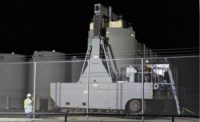On March 24, the grand jury indicted Matthew D. Correll, who was on the staff of a subcontractor of Bechtel Group Inc. at the $2.5-billion Watts Bar Unit 2 nuclear powerplant expansion site in Rhea County, Tenn.
Correll was charged with falsely indicating last August that he had measured and inspected cables that were to supply energy to safety systems in the unit’s nuclear reactor containment structure.
In a March 25 statement, the subcontractor, Williams Specialty Services LLC, Tucker, Ga., said Correll’s employment ended last September. The firm is a wholly-owned subsidiary of Williams Industrial Services Group LLC, which ranks 174th on ENR’s list of the Top 400 Contractors, with $348 million in 2009 revenue.
Correll could not be reached for comment.
According to the two-count indictment, Correll was assigned to a crew tasked with measuring the diameter of cables using a micrometer. “The cables were designed to provide electric power to operate equipment, including safety systems, in the nuclear reactor containment structure in Unit,” the indictment document states.
It was Correll’s responsibility to accurately document that he had inspected and measured the cables and to complete forms regarding those measurements and inspections, the indictment said.
“Cutting corners on the construction of our nuclear power plants is a serious matter,” U.S. Attorney Bill Killian said in a statement.
Penny Sherrod-Campanizzi, chief operating officer of Williams Industrial Services Group said in the statement that the company “learned of the indictment yesterday and was unaware that federal prosecutors were pursuing this action." It declined further comment on the legal proceedings.
However, she said that “through its own internal control processes, Williams identified the documentation issue and acted proactively...to take appropriate immediate actions. All necessary corrective steps have now been taken to eliminate potential future risks associated with this matter.”
She added that the firm is “acting in full cooperation with all regulatory agencies, TVA and Bechtel,” and has been working in the nuclear services sector for over 20 years with “a very strong safety and regulatory compliance record.”
A Bechtel spokeswoman said the contractor has a rigorous training program in place for its employees and it expects its subcontractors to abide by the same ethical and professional standards.
According to published reports, Correll was arrested and released, and is set for trial on May 23 in U.S. district court in Chattanooga.
The unit was partially constructed when it was halted in 1988 because the capacity was not needed. TVA resurrected the 1,150-MW project in 2007 and expects it to be completed in 2012.
TVA said the concerns were discovered and investigated by TVA’s Inspector General. TVA has been reviewing other work performed by Correll to make sure similar issues do not exist, Ashok Bhatnagar, senior vice president for the federal power producer, said in a statement.
Scott Brooks, a TVA spokesman, says that any work that needed to be done after discovery of the falsifications in August has been done. TVA is not releasing many details on the issue because of nuclear security and safety, he says.
“This shows why nuclear power requires multiple, multiple reviews,” says Stephen Smith, executive director of Southern Alliance for Clean Energy. “Problems can get out of control quickly. Nuclear systems are inherently unforgiving.”




Post a comment to this article
Report Abusive Comment